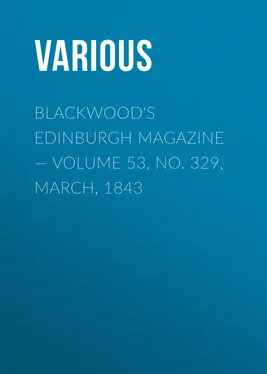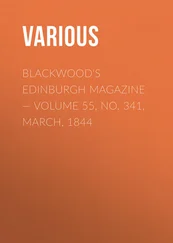Various - Blackwood's Edinburgh Magazine — Volume 53, No. 329, March, 1843
Здесь есть возможность читать онлайн «Various - Blackwood's Edinburgh Magazine — Volume 53, No. 329, March, 1843» — ознакомительный отрывок электронной книги совершенно бесплатно, а после прочтения отрывка купить полную версию. В некоторых случаях можно слушать аудио, скачать через торрент в формате fb2 и присутствует краткое содержание. Издательство: Иностранный паблик, Жанр: foreign_antique, periodic, foreign_edu, на английском языке. Описание произведения, (предисловие) а так же отзывы посетителей доступны на портале библиотеки ЛибКат.
- Название:Blackwood's Edinburgh Magazine — Volume 53, No. 329, March, 1843
- Автор:
- Издательство:Иностранный паблик
- Жанр:
- Год:неизвестен
- ISBN:нет данных
- Рейтинг книги:3 / 5. Голосов: 1
-
Избранное:Добавить в избранное
- Отзывы:
-
Ваша оценка:
- 60
- 1
- 2
- 3
- 4
- 5
Blackwood's Edinburgh Magazine — Volume 53, No. 329, March, 1843: краткое содержание, описание и аннотация
Предлагаем к чтению аннотацию, описание, краткое содержание или предисловие (зависит от того, что написал сам автор книги «Blackwood's Edinburgh Magazine — Volume 53, No. 329, March, 1843»). Если вы не нашли необходимую информацию о книге — напишите в комментариях, мы постараемся отыскать её.
Blackwood's Edinburgh Magazine — Volume 53, No. 329, March, 1843 — читать онлайн ознакомительный отрывок
Ниже представлен текст книги, разбитый по страницам. Система сохранения места последней прочитанной страницы, позволяет с удобством читать онлайн бесплатно книгу «Blackwood's Edinburgh Magazine — Volume 53, No. 329, March, 1843», без необходимости каждый раз заново искать на чём Вы остановились. Поставьте закладку, и сможете в любой момент перейти на страницу, на которой закончили чтение.
Интервал:
Закладка:
Mentioning Peróffsky, whose "Monastírka" gives a picture of Russian interior life, we pass to Gretch, an author of some European reputation. His "Trip to Germany" describes, with singular piquancy, the manners of a very curious race—the Germans of St Petersburg; and "Tchérnaia Jénstchina," "the Black Woman," presents a picture of Russian society, which was welcomed with great eagerness by the public.
The object of these pages being to invite the attention of British readers to a very rich field, in a literature hitherto most unaccountably neglected by the English public, the present would not be a fit occasion to enter with any minuteness into the history of Russian letters, or to give, in fact, more than a passing allusion to its chief features; the translator hopes that he will be excused for the meagreness of the present notice.
He will be abundantly repaid for his exertions, by the discovery of any increasing desire on the part of his countrymen to become more accurately acquainted with the character of a nation, worthy, he is convinced, of a very high degree of respect and admiration. How could that acquaintance be so delightfully, or so effectually made, as by the interchange of literature? The great works of English genius are read, studied, and admired, throughout the vast empire of Russia; the language of England is rapidly and steadily extending, and justice, no less than policy, demands, that many absurd misapprehensions respecting the social and domestic character, no less than the history, of Russia, should be dispelled by truth.
The translator, in conclusion, trusts that it will not be superfluous to specify one or two of the reasons which induced him to select the present romance, as the first-fruit of his attempt to naturalize in England the literature of Russia.
It is considered as a very good specimen of the author's style; the facts and characters are all strictly true; 10 10 The translator recently met in society a Russian officer, who had served with distinction in the country which forms the scene of "Ammalát Bek." This gentleman had intimately known Marlínski, and bore witness to the perfect accuracy of his delineations, as well of the external features of nature as of the characters of his dramatis personæ . The officer alluded to had served some time in the very regiment commanded by the unfortunate Verkhóffsky. Our fair readers may be interested to learn, that Seltanetta still lives, and yet bears traces of her former beauty. She married the Shamkhál, and now resides in feudal magnificence at Tarki, where she exercises great sway, which she employs in favour of the Russian interest, to which she is devoted.
besides this, the author passed many years in the Caucasus, and made full use of the opportunities he thus enjoyed of becoming familiar with the language, manners, and scenery of a region on which the attention of the English public has long been turned with peculiar interest.
The picturesqueness as well as the fidelity of his description will, it is hoped, secure for the tale a favourable reception with a public always " novitatis avida ," and whose appetite, now somewhat palled with the "Bismillahs" and "Mashallahs" of the ordinary oriental novels, may find some piquancy in a new variety of Mahomedan life—that of the Caucasian Tartars.
The Russian language possessing many characters and some few sounds for which there is no exact equivalent in English, we beg to say a word upon the method adopted on the present occasion so to represent the Russian orthography, as to avoid the shocking barbarisms of such combinations as zh , &c. &c., and to secure, at the same time, an approach to the correct pronunciation. Throughout these pages the vowels a, e, i, o, y , are supposed to be pronounced as in French, the diphthong ou as in the word you , the j always with the French sound.
With respect to the combinations of consonants employed, kh has the gutteral sound of the ch in the Scottish word loch , and gh is like a rather rough or coarse aspirate.
The simple g is invariably to be uttered hard, as in gun or gall .
To avoid the possibility of errors, the combination tch , though not a very soft one to the eye, represents a Russian sound for which there is no character in English. It is, of course, uttered as in the word watch .
As a great deal of the apparent discord of Russian words, as pronounced by foreigners, arises from ignorance of the place of the accent, we have added a sign over every polysyllable word, indicating the part on which the stress is to be laid.
The few preceding rules will, the translator hopes, enable his countrymen to attack the pronunciation of the Russian names without the ancient dread inspired by terrific and complicated clusters of consonants; and will perhaps prove to them that the language is both an easy and a melodious one.
St Petersburg, November 10, 1842.
CHAPTER I
"Be slow to offend—swift to revenge!"
Inscription on a dagger of Daghestán.It was Djoumá. 11 11 Djoumá answers to our Sabbath. The days of the Mahomedan week are as follows: Shambi, Saturday; Ikhshambá, Sunday; Doushambá, Monday; Seshambá, Tuesday; Tchershambá, Wednesday; Pkhanshambá, Thursday; Djoumá, Friday.
Not far from Bouináki, a considerable village of Northern Daghestán, the young Tartars were assembled for their national exercise called "djigítering;" that is, the horse-race accompanied by various trials of boldness and strength. Bouináki is situated upon two ledges of the precipitous rocks of the mountain: on the left of the road leading from Derbend to Tarki, rises, soaring above the town, the crest of Caucasus, feathered with wood; on the right, the shore, sinking imperceptibly, spreads itself out into meadows, on which the Caspian Sea pours its eternal murmur, like the voice of human multitudes.
A vernal day was fading into evening, and all the inhabitants, attracted rather by the coolness of the breeze than by any feeling of curiosity, had quitted their sáklas, 12 12 Sákla, a Circassian hut.
and assembled in crowds on both sides of the road. The women, without veils, and with coloured kerchiefs rolled like turbans round their heads, clad in the long chemise, 13 13 A species of garment, resembling a frock-coat with an upright collar, reaching to the knees, fixed in front by hooks and eyes, worn by both sexes.
confined by the short arkhaloúkh, and wide toumáns, 14 14 The trowsers of the women : those worn by the men, though alike in form, are called shalwárs. It is an offence to tell a man that he wears the toumán; being equivalent to a charge of effeminacy; and vice versâ .
sat in rows, while strings of children sported before them. The men, assembled in little groups, stood, or rested on their knees; 15 15 It is the ordinary manner of the Asiatics to sit in this manner in public, or in the presence of a superior.
others, in twos or threes, walked slowly round, smoking tobacco in little wooden pipes: a cheerful buzz arose, and ever and anon resounded the clattering of hoofs, and the cry "katch, katch!" (make way!) from the horsemen preparing for the race.
Nature, in Daghestán, is most lovely in the month of May. Millions of roses poured their blushes over the crags; their odour was streaming in the air; the nightingale was not silent in the green twilight of the wood, almond-trees, all silvered with their flowers, arose like the cupolas of a pagoda, and resembled, with their lofty branches twined with leaves, the minarets of some Mussulman mosque. Broad-breasted oaks, like sturdy old warriors, rose here and there, while poplars and chenart-trees, assembled in groups and surrounded by underwood, looked like children ready to wander away to the mountains, to escape the summer heats. Sportive flocks of sheep—their fleeces speckled with rose-colour; buffaloes wallowing in the mud of the fountains, or for hours together lazily butting each other with their horns; here and there on the mountains noble steeds, which moved (their manes floating on the breeze) with a haughty trot along the hills—such is the frame that encloses the picture of every Mussulman village. On this Djoumá, the neighbourhood of Bouináki was more than usually animated. The sun poured his floods of gold on the dark walls of the flat-roofed sáklas, clothing them with fantastic shadows, and adding beauty to their forms. In the distance, crawling along the mountain, the creaking arbas 16 16 A kind of rude cart with two wheels.
flitted among the grave-stones of a little burial-ground ... past them, before them, flew a horseman, raising the dust along the road ... the mountain crest and the boundless sea gave grandeur to this picture, and all nature breathed a glow of life.
Интервал:
Закладка:
Похожие книги на «Blackwood's Edinburgh Magazine — Volume 53, No. 329, March, 1843»
Представляем Вашему вниманию похожие книги на «Blackwood's Edinburgh Magazine — Volume 53, No. 329, March, 1843» списком для выбора. Мы отобрали схожую по названию и смыслу литературу в надежде предоставить читателям больше вариантов отыскать новые, интересные, ещё непрочитанные произведения.
Обсуждение, отзывы о книге «Blackwood's Edinburgh Magazine — Volume 53, No. 329, March, 1843» и просто собственные мнения читателей. Оставьте ваши комментарии, напишите, что Вы думаете о произведении, его смысле или главных героях. Укажите что конкретно понравилось, а что нет, и почему Вы так считаете.












